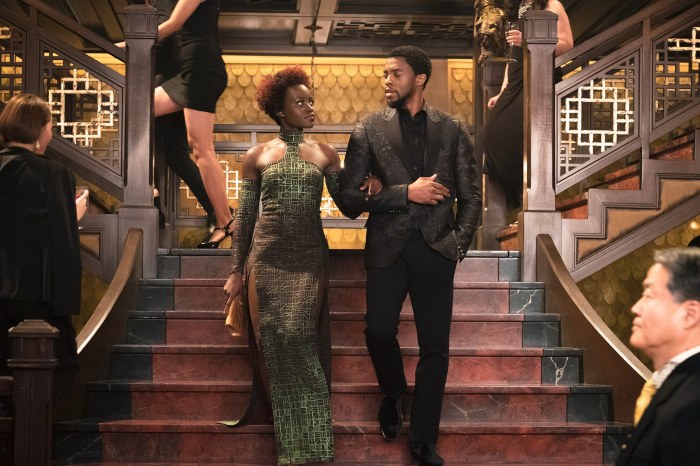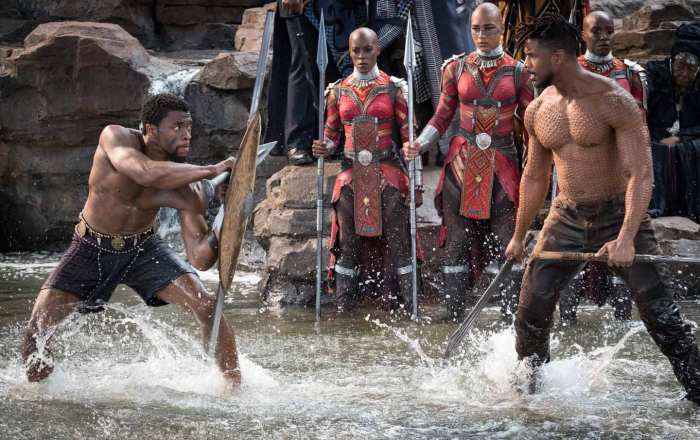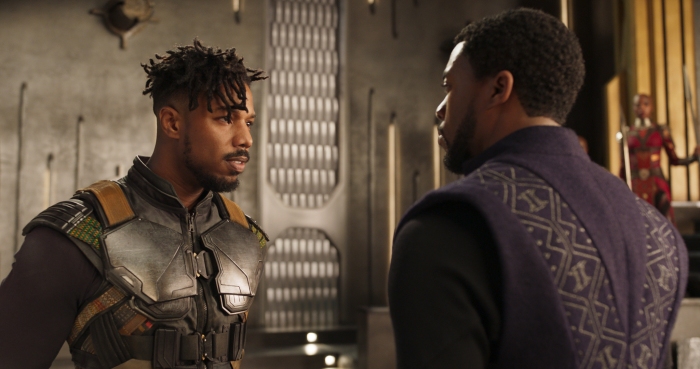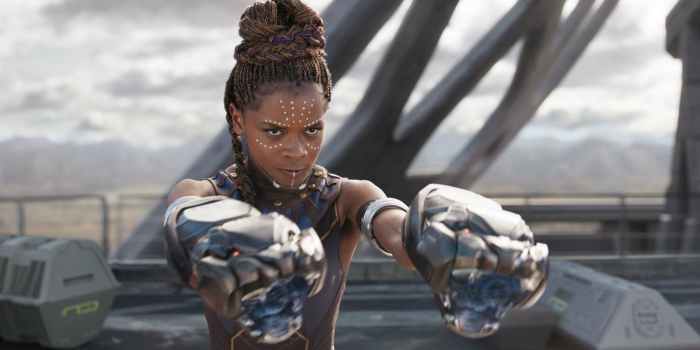While I’m aware that Black Panther has broken a bunch of box office records – like recouping its $200 million budget in its opening weekend – I don’t know who has been going to see it, as I’m sure all of you have been waiting to read my review. Wait no longer!
One of the most telling lines from Black Panther – uttered by Shuri, King T’Challa’s little sister and probably my favorite new character – is “Just because something works doesn’t mean it can’t be improved.” This line seems to embody what the game plan has been with Black Panther, and Kevin Feige and company seem to be at the height of their powers in terms of making plans into realities. Black Panther is a complete, well-polished, and above all unique Marvel thrill ride that elevates the MCU to new heights at a time when new heights probably weren’t thought possible by most. It also seems to arrive at a very opportune time, when the current political climate and social issues at the forefront of our minds tie in well with the messages of the film, begging the question of how calculated the timing of its release really is.

Too sharp to touch.
Before I get into the deeper stuff, let’s just start by saying that Black Panther is fun in exactly the way you’d expect a Marvel movie to be, and perhaps more fun at times. The casino and car chase scenes in Korea – shown frequently in the trailer and marketing materials – are some of the better action scenes in the MCU, on par in my book with the fight scenes in Winter Soldier (my personal favorite MCU installment – a ranking of all of the Marvel movies probably deserves its own post at this point). These portions of Black Panther have the feel of a James Bond movie more than a superhero flick at times, with a powerful aura of coolness and little mention of superhuman abilities. This de-emphasis on superhuman abilities also extends to the ritual combat scenes taking place in Wakanda – also some of the more thrilling bits of Black Panther, probably for that very reason. Stripping away T’Challa’s powers immediately prior to a deadly battle with axes and spears allows all of us to relate to him just a little bit more, and obviously adds suspense where suspense might be needed.

T’Challa and Killmonger squaring off in ritual combat.
The cast is all around very good – Michael B. Jordan in particular is fantastic as Killmonger, the MCU’s latest (and definitely most competent) attempt to solve Marvel’s villain problem. A villain with a somewhat typical revenge plotline but atypical motivations beneath the surface, Killmonger is teamed up with Klaue – an arms dealer you may remember from Age of Ultron, played by Andy Serkis of Lord of the Rings/Planet of the Apes fame. This duo of baddies, in their craftiness and wanton desire for destruction, composes the strongest set of antagonists Marvel has seen since Winter Soldier (you know – before he turned into a good guy). Also of note are Lupita Nyong’o as Nakia, a Wakandan spy, Daniel Kaluuya (as seen in Oscar darling Get Out and Black Mirror) as T’Challa’s best friend W’Kabi, Letitia Wright as T’Challa’s Q-like little sister Shuri, Angela Bassett as Ramonda, Danai Gurira as Wakandan general Okoye, and Forest Whitaker, appearing as Wakandan shaman Zuri in a role similar to his stint in Rogue One but far better executed. Of course, there’s also Chadwick Boseman as the Black Panther himself, introduced in Civil War but given a more full-fledged origin story of sorts here. In an overly star-studded cast, Boseman holds his own in the titular role, but just barely, as he’s often overshadowed by the likes of Jordan, Wright, and Nyong’o specifically.

One of the more tense dramatic scenes in Black Panther.
And there’s also Everett Ross, played by Martin Freeman (Sherlock, The Hobbit). Ross is a former pilot turned CIA agent who has popped up briefly in the past – during Civil War – and who appears to perhaps be the next Phil Coulson (a glue-like character similar to the continually absent Nick Fury, and who in my opinion was killed way too soon). What the future holds for Everett Ross is uncertain, but what seems clear is that he’ll be an important piece of the puzzle as we approach the Infinity Wars. In the meantime, it seems the character is apparently inspired partly by Chandler Bing (yes, that Chandler Bing), so that’s…something.

I was going to try to find a picture of Ross, but this is just way cooler.
These characters are all placed against the backdrop of one of Marvel’s more in-depth worldbuilds in the fictional African country of Wakanda, a well-hidden nation consisting of five tribes and built upon a veritable goldmine of Vibranium – that stuff that Captain America‘s shield, along with plenty of other Marvel gear, is made of. Wakanda has hints of Asgard, hints of Sakaar, and even a bit of Themyscira, but it’s also on a whole other level in terms of the use of color and high-tech toys in a low-tech world. Wakanda is Blade Runner-esque completely foreign in its futurization and its mythos, and it’s also here on Earth, which gives it a compelling leg up over the more cosmic locales mentioned. Ryan Coogler (Fruitvale Station, Creed) seems to have been a fantastic choice to direct, and does some excellent work creating the world of Black Panther.

Our first view of Wakanda, early in the film.
Throughout the building action, Black Panther does the globetrotting that most Marvel movies do, bouncing quickly from Nigeria to Oakland to the UK to South Korea, but of course, Wakanda remains the primary focus throughout, as members of its power structure struggle with the responsibility to use its resources and technology to help the countless people across the world with whom they share ancestry. Black Panther deftly handles the social issues that you’d expect it to, but it also asks sobering and timely questions about complex ideas that completely transcend the fictional universe in which they’re asked, touching on things like altruism versus isolationism, and the best ways in which to use power when it’s yours. While it’s clear throughout that responsibility is a core theme and a core Wakandan value, what Black Panther’s characters grapple with is how to best help those that need it, and what’s entertaining about this journey is that most characters likely have motives that aren’t either completely virtuous or vice versa. There’s a fair amount of grey area in which to operate, and while some ideas – namely Killmonger’s plan for escalation of violence – are clearly wrong, there are others that can’t be painted as black or white.

Shuri is the bomb.
It all adds up to an incredible ride that’s suitably and adequately different, and lives up to the enormous hype that it has built over the past few months. It’s not as funny as more recent MCU installments like Thor: Ragnarok, nor should it be. It also doesn’t have as many callouts to other franchise components as many other Marvel movies do, and in fact it doesn’t do much of anything to set the stage for the coming Infinity Wars – it’s overall self-contained, which is refreshing, and it doesn’t overreach because it probably knows it doesn’t need to. Either way, Black Panther is a thrilling ride that convincingly bucks the notion that Marvel films are turning into one same-old after another, and it’s well-worth checking out. And of course, stay tuned afterwards for the post-credits scenes – there are two – though I’ll admit that they’re probably the most underwhelming part of the whole experience.
[…] Movies Seen: 5 (Wonder Woman, Thor: Ragnarok, Black Panther, Avengers: Infinity War, Deadpool […]
LikeLike
[…] time I’m wrong, and in the meantime, check out my reviews of A Star Is Born, BlacKkKlansman, Black Panther, and The […]
LikeLike